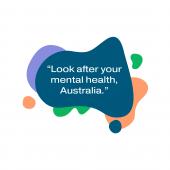Look after your mental health, Australia
Mental Health Australia has today launched a new social awareness and connection campaign to promote positive mental health and wellbeing during this time of physical distancing and heightened anxiety in our community.
Acting CEO Melanie Cantwell said social connection and wellbeing has never been more important as we all try to adjust to the many and ongoing changes in our lives at this time.
“The message is simple…look after your mental health, Australia,” said Ms Cantwell.
“It seems hard to do this right now, but you can stay connected with friends and family even though you might be physically distant from them at this time.”
“Eat well. Sleep well. Exercise. And find new ways to engage socially, just like we’ve seen the rest of the world doing from their balconies and back yards.”
“Being physically distant is the best way to look after our physical health at this time, but we have to make sure we look after our mental health and wellbeing as well, and that means staying socially connected.”
Working with organisations and businesses around Australia, as well as prominent members of our community, Mental Health Australia will promote a series of community-driven ideas over the coming weeks to help people keep mentally well during this difficult time.
The best way to follow the campaign is via social media using the hashtag #LookAfterYourMentalHealthAustralia.
Here are five ways to get things started:
1. Stay active
Exercise increases wellbeing and helps reduce symptoms of common mental health concerns. Your gym may have closed or your fitness groups may be cancelled, but that doesn’t mean you can’t exercise. Yoga, Pilates, HIIT routines can be done in a relatively small space and with no equipment. Have a search on the internet for free workout videos and guides.
2. Eat well
Eating a nutritious diet is great for both your physical and mental health. As much as possible, try and stick to a healthy diet despite changes to routine and environment. And supermarket availability.
3. Connect with others
Physical distancing is crucial right now, but social connection is more important than ever. Use technology to talk to your friends and family, using video chats to talk face-to-face where possible. Reach out to your neighbours and community. Share how you’re feeling, and invite others to share with you.
4. Limit coronavirus media consumption (and choose trusted sources)
Choose how often you engage with news and social media about the coronavirus, and be sure to find news sources that are trustworthy and factual. It might help to add in some content that makes you laugh and feel comfortable wherever possible.
5. Try and keep to a routine and make it fun
Keep to a regular routine as much as possible, including exercise, sleep, daily chores, work, recreational activities and connecting with others… and make it fun where you can. We will come through this.
Online and telephone resources:
• Head to Health – www.headtohealth.gov.au/
• Lifeline 13 11 14 - 24 hours a day, 7 days a week
• Lifeline Text 0477 13 11 14 – 6pm to midnight (AEDT), 7 nights a week
• Beyond Blue – 1300 22 4636 - www.beyondblue.org.au
• Butterfly Foundation National Helpline: 1800 334 673
• Carer Support: 1800 242 636 or 1300 554 660
• SANE Australia Helpline: 1800 187 263
• Suicide Call Back Service: 1300 659 467
• Kids Helpline – 1800 55 1800 www.kidshelpline.com.au
• MensLine Australia: 1300 789 978
• QLife: 1800 184 527
• Open Arms – Veterans and Families Counselling: 1800 011 046
• Black Dog – www.blackdoginstitute.org.au
• Headspace - www.eheadspace.org.au
• R U OK?: www.ruok.org.au
• ReachOut: www.au.reachout.com
• World Mental Health Day – www.1010.org.au
Media Contact: Lach Searle 0488 076 088

| Attachment | Kind | Size |
|---|---|---|
| 168.42 KB |




